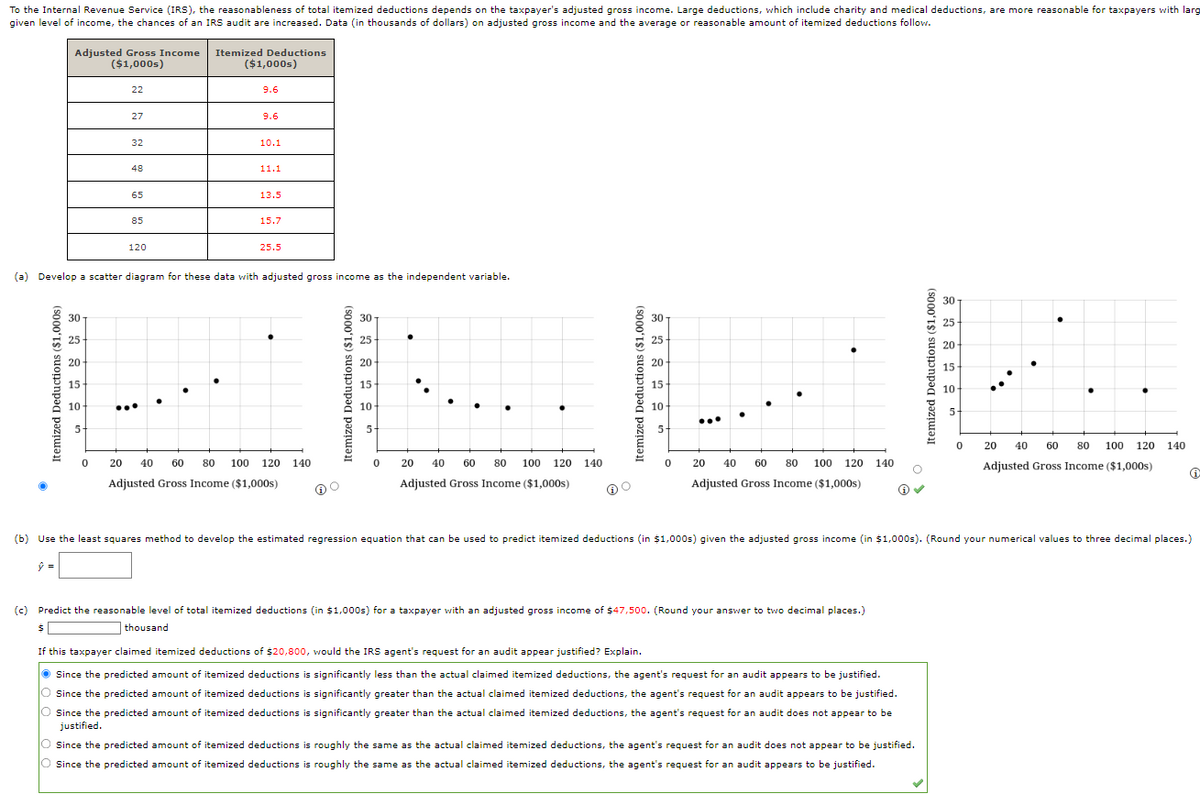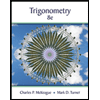($1,000s) 22 ($1,000) 9.6 To the Internal Revenue Service (IRS), the reasonableness of total itemized deductions depends on the taxpayer's adjusted gross income. Large deductions, which include charity and medical deductions, are more reasonable for taxpayers with larg given level of income, the chances of an IRS audit are increased. Data (in thousands of dollars) on adjusted gross income and the average or reasonable amount of itemized deductions follow. Adjusted Gross Income Itemized Deductions 27 9.6 32 10.1 48 11.1 65 13.5 85 15.7 120 25.5 (a) Develop a scatter diagram for these data with adjusted gross income as the independent variable. Itemized Deductions ($1,000s) 20 15 10 3. 30 25 20- 15- 10 5 Itemized Deductions ($1,000s) Itemized Deductions ($1,000s) 20 15 10 30 25 20 15- 10- 5- temized Deductions ($1,000s) 0 20 40 60 80 100 120 140 Adjusted Gross Income ($1,000s) 0 20 40 60 80 100 120 140 Adjusted Gross Income ($1,000s) 0 20 40 60 80 100 120 140 Adjusted Gross Income ($1,000s) Adjusted Gross Income ($1,000s) G (b) Use the least squares method to develop the estimated regression equation that can be used to predict itemized deductions (in $1,000s) given the adjusted gross income (in $1,000s). (Round your numerical values to three decimal places.) 9-> (c) Predict the reasonable level of total itemized deductions (in $1,000s) for a taxpayer with an adjusted gross income of $47,500. (Round your answer to two decimal places.) thousand If this taxpayer claimed itemized deductions of $20,800, would the IRS agent's request for an audit appear justified? Explain. Since the predicted amount of itemized deductions is significantly less than the actual claimed itemized deductions, the agent's request for an audit appears to be justified. Since the predicted amount of itemized deductions is significantly greater than the actual claimed itemized deductions, the agent's request for an audit appears to be justified. Since the predicted amount of itemized deductions is significantly greater than the actual claimed itemized deductions, the agent's request for an audit does not appear to be justified. Since the predicted amount of itemized deductions is roughly the same as the actual claimed itemized deductions, the agent's request for an audit does not appear to be justified. Since the predicted amount of itemized deductions is roughly the same as the actual claimed itemized deductions, the agent's request for an audit appears to be justified. 0 20 40 60 80 100 120 140
($1,000s) 22 ($1,000) 9.6 To the Internal Revenue Service (IRS), the reasonableness of total itemized deductions depends on the taxpayer's adjusted gross income. Large deductions, which include charity and medical deductions, are more reasonable for taxpayers with larg given level of income, the chances of an IRS audit are increased. Data (in thousands of dollars) on adjusted gross income and the average or reasonable amount of itemized deductions follow. Adjusted Gross Income Itemized Deductions 27 9.6 32 10.1 48 11.1 65 13.5 85 15.7 120 25.5 (a) Develop a scatter diagram for these data with adjusted gross income as the independent variable. Itemized Deductions ($1,000s) 20 15 10 3. 30 25 20- 15- 10 5 Itemized Deductions ($1,000s) Itemized Deductions ($1,000s) 20 15 10 30 25 20 15- 10- 5- temized Deductions ($1,000s) 0 20 40 60 80 100 120 140 Adjusted Gross Income ($1,000s) 0 20 40 60 80 100 120 140 Adjusted Gross Income ($1,000s) 0 20 40 60 80 100 120 140 Adjusted Gross Income ($1,000s) Adjusted Gross Income ($1,000s) G (b) Use the least squares method to develop the estimated regression equation that can be used to predict itemized deductions (in $1,000s) given the adjusted gross income (in $1,000s). (Round your numerical values to three decimal places.) 9-> (c) Predict the reasonable level of total itemized deductions (in $1,000s) for a taxpayer with an adjusted gross income of $47,500. (Round your answer to two decimal places.) thousand If this taxpayer claimed itemized deductions of $20,800, would the IRS agent's request for an audit appear justified? Explain. Since the predicted amount of itemized deductions is significantly less than the actual claimed itemized deductions, the agent's request for an audit appears to be justified. Since the predicted amount of itemized deductions is significantly greater than the actual claimed itemized deductions, the agent's request for an audit appears to be justified. Since the predicted amount of itemized deductions is significantly greater than the actual claimed itemized deductions, the agent's request for an audit does not appear to be justified. Since the predicted amount of itemized deductions is roughly the same as the actual claimed itemized deductions, the agent's request for an audit does not appear to be justified. Since the predicted amount of itemized deductions is roughly the same as the actual claimed itemized deductions, the agent's request for an audit appears to be justified. 0 20 40 60 80 100 120 140
Trigonometry (MindTap Course List)
8th Edition
ISBN:9781305652224
Author:Charles P. McKeague, Mark D. Turner
Publisher:Charles P. McKeague, Mark D. Turner
Chapter8: Complex Numbers And Polarcoordinates
Section: Chapter Questions
Problem 2RP: A Bitter Dispute With the publication of Ars Magna, a dispute intensified between Jerome Cardan and...
Related questions
Question

Transcribed Image Text:($1,000s)
($1,000s)
To the Internal Revenue Service (IRS), the reasonableness of total itemized deductions depends on the taxpayer's adjusted gross income. Large deductions, which include charity and medical deductions, are more reasonable for taxpayers with larg
given level of income, the chances of an IRS audit are increased. Data (in thousands of dollars) on adjusted gross income and the average or reasonable amount of itemized deductions follow.
Adjusted Gross Income Itemized Deductions
22
9.6
27
9.6
32
10.1
48
11.1
65
13.5
85
15.7
120
25.5
(a) Develop a scatter diagram for these data with adjusted gross income as the independent variable.
Itemized Deductions ($1,000s)
30
25
20
15
10-
5
0
20 40 60
80 100 120 140
Adjusted Gross Income ($1,000s)
Itemized Deductions ($1,000s)
30
25
20
15
10
5
0
20 40 60 80 100 120 140
Adjusted Gross Income ($1,000s)
30-
25
20
15
10
5-
Itemized Deductions ($1,000s)
0
20 40 60 80 100 120
140
Adjusted Gross Income ($1,000s)
30
ྴ ཤྩ ྴ ཱ བྷཱུ ཨཾ
25
20
15
5
Itemized Deductions ($1,000s)
0
20 40 60 80 100 120 140
Adjusted Gross Income ($1,000s)
(b) Use the least squares method to develop the estimated regression equation that can be used to predict itemized deductions (in $1,000s) given the adjusted gross income (in $1,000s). (Round your numerical values to three decimal places.)
ŷ =
(c) Predict the reasonable level of total itemized deductions (in $1,000s) for a taxpayer with an adjusted gross income of $47,500. (Round your answer to two decimal places.)
thousand
$
If this taxpayer claimed itemized deductions of $20,800, would the IRS agent's request for an audit appear justified? Explain.
Since the predicted amount of itemized deductions is significantly less than the actual claimed itemized deductions, the agent's request for an audit appears to be justified.
Since the predicted amount of itemized deductions is significantly greater than the actual claimed itemized deductions, the agent's request for an audit appears to be justified.
Since the predicted amount of itemized deductions is significantly greater than the actual claimed itemized deductions, the agent's request for an audit does not appear to be
justified.
Since the predicted amount of itemized deductions is roughly the same as the actual claimed itemized deductions, the agent's request for an audit does not appear to be justified.
Since the predicted amount of itemized deductions is roughly the same as the actual claimed itemized deductions, the agent's request for an audit appears to be justified.
Expert Solution
This question has been solved!
Explore an expertly crafted, step-by-step solution for a thorough understanding of key concepts.
Step by step
Solved in 5 steps with 17 images

Recommended textbooks for you

Trigonometry (MindTap Course List)
Trigonometry
ISBN:
9781305652224
Author:
Charles P. McKeague, Mark D. Turner
Publisher:
Cengage Learning


Trigonometry (MindTap Course List)
Trigonometry
ISBN:
9781305652224
Author:
Charles P. McKeague, Mark D. Turner
Publisher:
Cengage Learning
